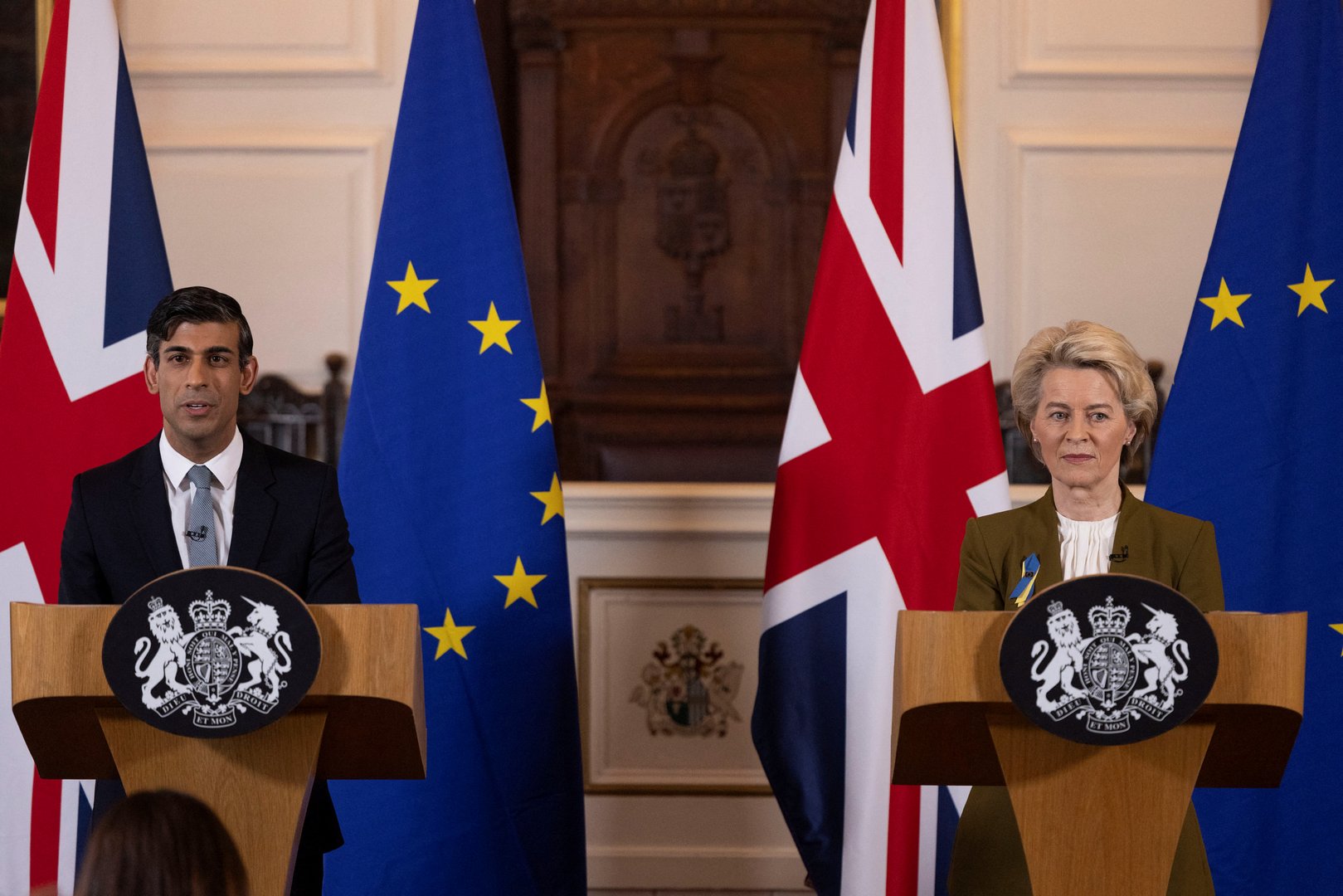Ireland and Cyprus have many things in common except one. Whereas membership of the EU helped rather than hindered the peace process in Northern Ireland, the opposite happened in Cyprus.
There is still hope that the EU’s genius for fudge and compromise might work its magic in Cyprus like it did for Northern Ireland at Windsor in England last week.
On February 27, 2022 the EU and the UK announced they had negotiated a document called the Windsor Framework for Northern Ireland.
It seems the trick is to think in terms of a framework instead of a treaty or protocol and Bob’s your uncle! Granted nomenclature matters in diplomacy, so do trust and a spirit of compromise. The EU did not trust the bombastic broad-brush approach of Boris Johnson. But they were able to trust Prime Minister Rishi Sunak’s technocratic attention to detail and his grasp of how businesses operate the economy and trade nationally and internationally in the 21st century.
The UK’s Withdrawal Agreement from the EU produced the Northern Ireland Protocol as it was deemed essential to protect the open border between Northern Ireland and the Republic of Ireland in line with the 1998 Belfast (Good Friday) Peace Agreement.
The Good Friday Agreement ended the violence in the province, and no one wanted a return to the troubles after Britain withdrew from the EU, so Northern Ireland had to retain an open border with the EU in the Republic of Ireland because it was central to the agreement.
The Protocol succeeded in maintaining an open border between the two Irelands but created a huge barrier to trade between mainland Britain and Northern Ireland and undermined the province’s place in the UK’s internal market.
Boris Johnson’s answer to the problem, on the advice of his attorney-general at the time, Suela Braverman QC (now interior minister), was to table draft legislation to override the Northern Ireland Protocol in breach of international law.
The advice was that the UK would be able to invoke the doctrine of necessity to justify a breach of international law. A failure to perform an international obligation is not unlawful in exceptional circumstances for a temporary period while the necessity lasts if it is the “only way” to cope with a “grave and imminent peril” affecting an“essential interest” of the state, provided the state invoking necessity did not contribute to the need to invoke it.
Presumably “the grave and imminent peril” faced by UK was the danger to peace in Northern Ireland, but it was not by any means certain that flouting international law was the “only way”.
Rishi Sunak, who became British prime minister after Boris Johnson and Liz Truss were both forced to resign last year, may have had greatness thrust upon him but he saw clearly that the path of negotiation had not been exhausted to justify breaking international law.
Johnson still espouses breaking international law but he does not understand the importance of Britain’s reputation post Brexit, whereas Sunak figured correctly that in a rules-based international order Britain could not be seen to be flouting the rules. The EU was amenable to reasonable compromise if the UK government returned to its predictable pragmatic ways and Sunak was a prime minister with whom they could do business.
The Windsor Framework is the product of the trust the EU is prepared to place in the UK government under Rishi Sunak. In politics as in life there are horses for courses. Johnson’s bombastic broad-brush approach was fine to get Brexit done and win the 2019 election for the Conservatives but he sold Ulster down the river in the process.
The Windsor Framework identifies three key areas where the EU accepts the Northern Ireland Protocol needs to be revisited.
The first is that trade with Northern Ireland needs to flow without red tape as an integral part of the UK’s internal market.
The obvious and fairest answer to that problem was to introduce the green and red lane system we all use when we travel and pass through customs. The EU has now agreed a lane system under which goods bound exclusively for Northern Ireland will pass through a green lane smoothly without let or hindrance.
The second problem was the cluster of EU laws that undermined Northern Ireland’s place in UK. Some goods available in the rest of UK were banned in Northern Ireland; medicines were subject to control by the European Medicines Agency approval instead of its UK equivalent; not all UK-wide VAT exemptions were available there; internal pet travel to the province was problematic; and subsidies to businesses were subject to EU competition rules. The EU has now agreed to repeal these laws because they do not safeguard Northern Ireland’s place in UK as required by the Good Friday Agreement.
Finally, in a move that was designed to appeal to Ulster Unionist MPs the EU agreed to provide the Northern Ireland parliament at Stormont with a tool called the ‘Stormont brake’ to block new EU goods laws from its institutions including the Court of Justice. This is a significant concession by the EU which gives the UK government the power to veto EU goods laws that are not approved by both communities in Northern Ireland.
It all now turns on how the Windsor Framework is received by the Democratic Unionists and their leader Sir Jeffrey Donaldson MP who, as it happens, is also a Cyprob buff. Back in February 2021 he told an internet discussion on Cyprus that communities in strife need a grassroots movement in civil society to solve their political differences rather than the UN’s top-down approach. But they also need to learn how not to a look gift horse in the mouth just because it is from the EU.
Alper Ali Riza is a king’s counsel in the UK and a retired part time judge







Click here to change your cookie preferences